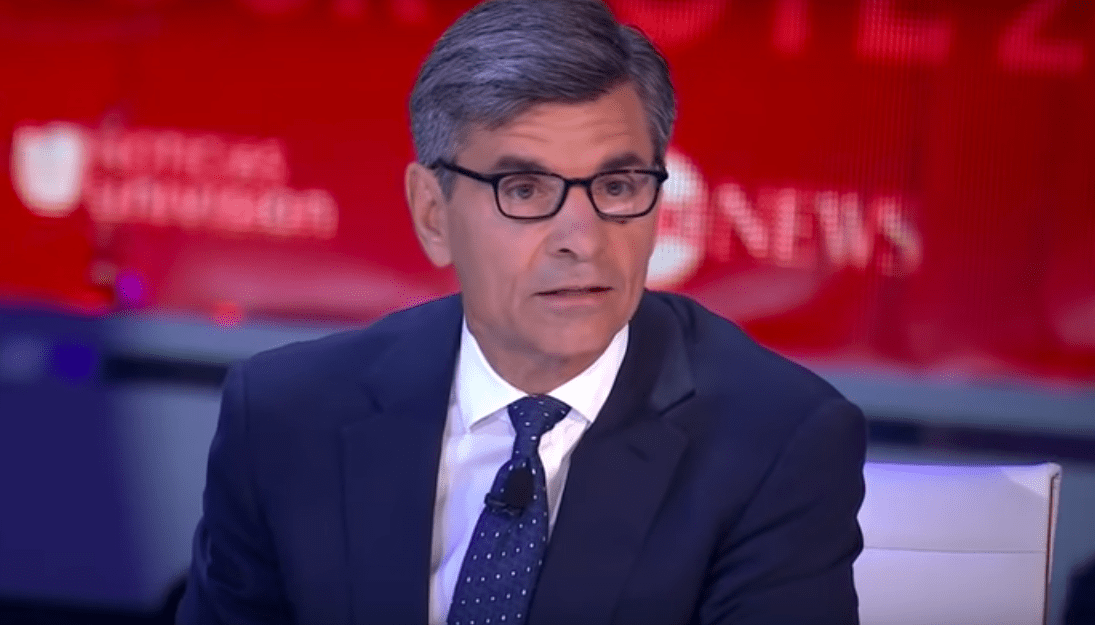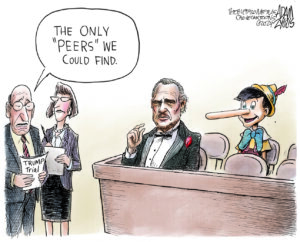Who’s Afraid of Democratic Socialism?
George Stephanopoulos would not stop bringing up the bogeyman of socialism at ABC's democratic primary debate. Screen shot / YouTube
Screen shot / YouTube
You knew it was going to be a long night when ABC’s George Stephanopoulos spent the first 11 minutes of the February 7 Democratic presidential debate directing a discussion about how risky it would be to have a democratic socialist at the top of the ticket.
After asking Joe Biden about the “risks” of nominating Bernie Sanders (or Pete Buttigieg)—setting Biden up to make his central campaign claim of electability—Stephanopoulos asked Sanders “why shouldn’t Democrats be worried,” when Donald Trump “certainly thinks this label socialism will work” in defeating him?
After Sanders’ response, Stephanopoulos asked the field, “Let me just ask, is anyone else on the stage concerned about having a democratic socialist at the top of the Democratic ticket?” Though Amy Klobuchar was the only candidate to raise her hand, he proceeded to turn to each remaining candidate to discuss socialism and electability.
Delving momentarily into policy, sort of, by asking Buttigieg whether Sanders’ “healthcare plan can bring people together,” and allowing a few more responses, Stephanopoulos turned back to non-policy issues with several questions about experience, this time focusing on Buttigieg.
In other words, the first half hour of the debate was almost entirely given over to non-policy sparring over electability (including the bogeyman of socialism) and experience.
Asking candidates to attack each other over electability or experience is one of the least useful ways to run a debate. Electability is a meaningless concept beloved by journalists who fear candidates who stray from the center (FAIR.org, 10/25/19); its ultimate test is not whether another candidate (or journalist) deems a candidate electable, but whether that candidate polls well and wins elections. And the candidate whose electability is most often questioned, Bernie Sanders, just won the popular vote in Iowa, and has consistently polled ahead of Trump in one-to-one matchups. (As Matthew Yglesias pointed out in Vox—1/31/20—this is true even if the polling question includes Trump calling Sanders “a socialist who supports a government takeover of healthcare and open borders.”)

Experience is at least somewhat more justifiable as a non-policy topic of interest, but simply asking opponents whether a candidate has the experience necessary to lead is lazy and rarely productive. As a rare example of a much more revealing way to talk about experience, take ABC correspondent Linsey Davis’ question to Buttigieg about his oversight of South Bend’s criminal justice system, in which disparities between black and white marijuana possession arrests increased during his tenure. When Buttigieg asserted that “the overall rate was lower than the national rate,” Davis corrected: “No, there was an increase. The year before you were in office, it was lower.”
Her refusal to let Buttigieg deny his record stands in stark contrast to the way moderators have repeatedly let Biden get away with denying his record on Iraq (FAIR.org, 1/9/20). In last week’s debate, Biden once again lied about his Iraq vote, saying: “I trusted George Bush to keep his word. He said he was not going to go into Iraq. He said he was only using this to unite the United Nations to insist we get inspectors in to see what Saddam was doing.”
Biden’s latest version of his Iraq revisionism should have been particularly easy for his questioner (David Muir) to debunk, given that the Iraq War authorization vote came two days after Bush’s infamous “mushroom cloud” speech, in which he laid out to the public why all efforts short of military action were likely to fail and announced that “Saddam Hussein must disarm himself—or, for the sake of peace, we will lead a coalition to disarm him.” But, whereas pressing candidates on their judgment and record would be a helpful way to get at the issue of experience, moderators instead seem to be mostly content to ask candidates to attack each other on the issue.
In total, ABC gave over more than a quarter of their prompts to non-policy issues (22 of 82), primarily these questions of electability and experience. International issues were the second-largest category (15), followed closely by governance and race (13 each) and the economy (12).

Of the international questions, several were about military, and ABC repeated its hawkish September debate performance (FAIR.org, 9/13/20)—including asking Elizabeth Warren almost exactly the same question she was asked in September. At that time, ABC‘s Muir asked her, “Would you keep [your] promise to bring the troops home starting right now with no deal with the Taliban?” When Warren answered in the affirmative, Stephanopoulos jumped in to make the correct answer clear:
Top US leaders, military leaders on the ground in Afghanistan, told me you can’t do it without a deal with the Taliban. You just said you would, you would bring them home. What if they told you that? Would you listen to their advice?
ABC‘s inability to accept Warren’s answer was made even more apparent when, in their second debate, Muir asked her virtually the exact same question:
Senator Warren, you recently said, quote, “We have one general after another in Afghanistan who comes in and says, ‘We’ve just turned the corner,’ and then what happens? It’s all the same. Someone new comes in and says, ‘We’ve just turned the corner.’ You said, “So many say it. We’re going in circles.” We were on the ground in Afghanistan and Iraq in recent months, and the generals told us that the US needs some US presence on the ground, US special forces some presence to go after ISIS and the terrorists. If you’re commander-in-chief, would you listen to the generals, or do they fall into the category of the generals you’ve mentioned before?
Muir continued to train fire on Warren’s antiwar positions, giving the floor to Biden next:
I want to take this to the vice president, because you have said of Senator Warren’s comments before, that the United States should get out of the Middle East, you have said, “I quite frankly was surprised that I have never heard anyone say with any serious background in foreign policy that we should pull all troops out of the Middle East.” Is Senator Warren wrong on this?
Muir likewise put a hawkish spin on his questions about the assassination of Iranian General Qassem Soleimani, setting the stage with this question to Buttigieg, which made no mention of international law, and followed the corporate media line that there was no doubt that Soleimani deserved to die (FAIR.org, 1/9/20):
While there is still debate about whether or not there was an imminent threat, there is no debate about whether or not Soleimani was a bad actor who was responsible for the deaths of many Americans. Given what you know about Soleimani, if your national security team came to you with an opportunity to strike, would Soleimani have been dead, or would he still be alive under your presidency?
Once again, the climate crisis got short shrift at five questions (6%); while some candidates, like Sanders and Steyer, tried to bring climate into other questions, ABC asked about only one environmental issue—the USMCA trade agreement—essentially pitching it as climate vs. jobs:
I want to turn to climate change and jobs here in America. President Trump just signed the United States/Mexico/Canada Agreement, many call it an updated NAFTA. But it does include incentives to make cars here in North America, and it does open Canadian markets for American dairy farmers. Senator Sanders, as we sit here in New Hampshire tonight, both New Hampshire senators, Maggie Hassan and Sen. Jeanne Shaheen, supported this, calling it a real win for workers and for farmers. You voted no, because you said you believe it takes us back years on climate. Were the senators from New Hampshire wrong?
In terms of how often each candidate was given the mike, Sanders and Biden, as the top-polling candidates, got the most speaking opportunities. But although Warren had twice the popular support as Buttigieg at the time (an average of 15% vs. 7.3%; see RealClearPolitics.com for all February 7 polling averages), he was given the floor 13 times to her 11. Klobuchar, despite averaging only 4.3% support in polls, got the same 11 chances to speak as Warren, and Tom Steyer, at 2.3%, only got one fewer at ten. In keeping with media’s marked lack of interest in hearing Andrew Yang speak (FAIR.org, 1/4/20), he came in far behind the rest, with seven, though he polls almost as well ( 3.8%) as Klobuchar.
Your support matters…Independent journalism is under threat and overshadowed by heavily funded mainstream media.
You can help level the playing field. Become a member.
Your tax-deductible contribution keeps us digging beneath the headlines to give you thought-provoking, investigative reporting and analysis that unearths what's really happening- without compromise.
Give today to support our courageous, independent journalists.






You need to be a supporter to comment.
There are currently no responses to this article.
Be the first to respond.